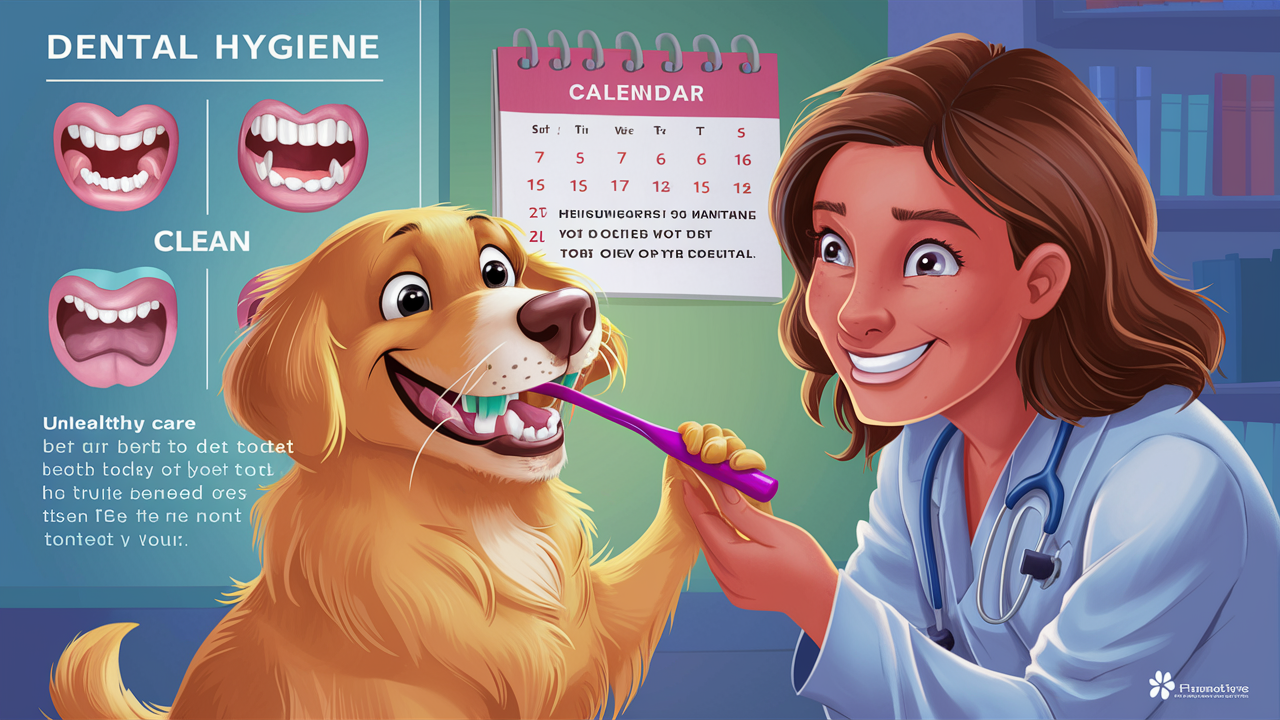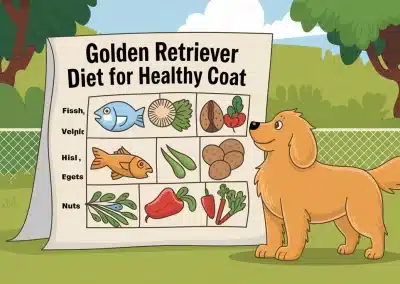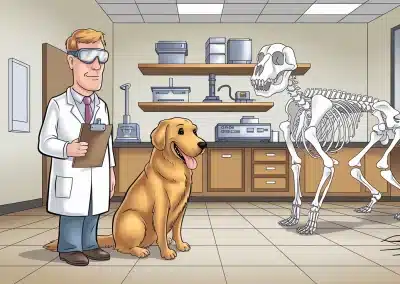How to Prevent Dental Diseases in Golden Retrievers. Golden Retrievers are known for their luscious golden coats and heartwarming smiles. But behind that charming grin could be lurking dental diseases that can cause not just bad breath, but serious health issues.
Oral health in these friendly canines is often overlooked, yet it’s just as crucial as caring for their fur or paws. After all, a Golden’s mouth is the gateway to their overall health, and preventing dental issues is key to ensuring a long, happy life for these beloved pets.

Dental care for Golden Retrievers should be as routine as their daily walks. It’s not just about flashing pearly whites for cute social media posts—keeping gums healthy and teeth clean can ward off periodontal disease, the silent culprit behind tooth loss and potential organ damage.
Have you ever wondered why oral health doesn’t get as much limelight as other aspects of pet care? Perhaps it’s time to shine a spotlight on those canine canines.
They say prevention is better than a cure, and that adage holds true when considering your Golden’s dental health. Neglecting oral care can lead to painful experiences for your furry companion, and hefty bills that could easily have been avoided.
So, how exactly should one go about maintaining a Golden Retriever’s dental health? Think of it as a bonding activity—a few minutes spent brushing those teeth could lead to more tail-wagging years together.
Understanding Golden Retriever Dental Health
Golden Retrievers, like humans, can suffer from various dental problems that can lead to serious health issues if not addressed. Recognizing these issues early on and maintaining good oral hygiene are critical steps in ensuring the well-being of these beloved dogs.
Common Dental Issues in Golden Retrievers
Golden Retrievers may experience a variety of dental issues. Plaque and tartar build-up can lead to gum disease, which, if left untreated, may progress to periodontal disease. This serious condition affects the gums and bones that support the teeth.
Tooth decay, which is less common in dogs than in humans, can still occur, especially if oral hygiene is neglected. A dog who loves to chew everything in sight, for example, might fracture a tooth, creating a haven for bacteria that can cause infections.
Signs of Dental Problems
One noticeable sign of dental problems is bad breath. While doggy breath isn’t expected to be minty fresh, an unusually foul odor can be indicative of an issue.
Other signs include reluctance to eat, swollen gums, and a visible build-up of tartar. When a Golden Retriever turns away from his favorite ball or seems hesitant to crunch on a hard treat, it may be more than just pickiness—it could be a sign of oral discomfort.
The Importance of Oral Hygiene
Regular oral hygiene is essential in preventing dental problems. It involves more than just occasional brushing; consistency is key.
Incorporating things like dental chews can aid in the mechanical scraping away of plaque. It’s like when you eat an apple and feel like you’ve just brushed your teeth—it’s not a replacement for brushing but it helps.
And while they can’t speak, the health of their gums and teeth speaks volumes about their overall health. It’s therefore important to brush a Golden Retriever’s teeth regularly with dog-specific toothpaste and to schedule annual professional dental cleanings.
Regular Dental Check-Ups and Professional Cleanings
Golden Retrievers are known for their winsome smiles, so it’s no wonder that keeping their pearly whites healthy requires more than just chew toys and treats. Regular visits to the vet for dental check-ups and professional cleanings are crucial to thwarting tooth decay and gum disease.
The Role of Veterinarians in Dental Care
Veterinarians play a pivotal role in the dental health of a Golden Retriever. They are trained to spot early signs of potential issues that a non-professional might miss.
During a dental check-up, the veterinarian will examine a dog’s mouth for any signs of oral disease, such as tartar buildup, gingivitis, or broken teeth – issues that, if left unchecked, could lead to serious health concerns.
These regular check-ups are essential for early detection and can save not only the dog’s well-being but also prevent costly procedures down the line.
Scheduling Professional Dental Cleanings
It’s not just about the vet glancing at your dog’s gums during an annual exam. Professional dental cleanings are integral to a Golden Retriever’s oral hygiene routine.
This is when the vet can thoroughly clean below the gumline, remove plaque and tartar, and polish their teeth, tasks that are impossible to do at home.
Consider scheduling professional cleanings as you would any other regular maintenance task for your beloved pet, like grooming.
Typically, these cleanings should be done annually, but your vet may recommend a different schedule based on your dog’s individual needs.
Daily Dental Care at Home
Good dental hygiene is crucial for a Golden Retriever’s overall health. Establishing a routine for daily dental care can prevent common dental diseases and maintain your pet’s well-being.
Brushing Your Dog’s Teeth
A toothbrush specifically designed for canines is your ally in the fight against plaque.
Just like you, your Golden Retriever needs his teeth brushed regularly. Ever wondered why? Removing the buildup is vital to prevent periodontal disease, which can lead to serious health issues.
Make it a bonding experience; stroke his fur, speak softly, and gently brush his teeth to keep those pearly whites healthy. For more information on brushing techniques and the importance of this process check out Cornell University College of Veterinary Medicine.
Choosing the Right Toothbrush and Toothpaste
It isn’t just about swiping a toothbrush across their teeth; it’s about choosing the right toothbrush and toothpaste.
Use a toothbrush with soft bristles tailored to fit your Retriever’s mouth comfortably.
Human toothpaste is a no-go for dogs; opt for a pet-formulated paste to keep their teeth brushing moments safe and enjoyable.
Consider turning to products formulated specifically for Golden Retrievers which can make all the difference in their dental health.
Diet and Nutrition for Dental Health

A Golden Retriever’s shining smile is not just a sign of happiness but also health. Ensuring that their diet promotes dental well-being is key to avoiding those dreaded vet visits for dental issues.
Foods That Promote Dental Health
When it comes to maintaining a Golden Retriever’s dental health, the role of a balanced diet cannot be overstated.
High-quality food with the right balance can be like brushing their teeth at every meal.
Crunchy kibble, for instance, helps reduce plaque build-up. Remember how refreshed you feel after a crispy apple? It’s similar for dogs and their kibble.
Foods rich in calcium and phosphorus are excellent for strengthening teeth, akin to the armor knights wore in battle.
- Chew toys and treats specifically designed for dental health can also perform dual roles; they’re not only fun but also scrub away tartar much like a fun loofah does in your shower.
- Including raw bones (but never cooked ones, as they can splinter) in their diet can act as nature’s dental brushes.
Ingredients to Avoid for Dental Well-Being
Just as candy can be a fiend for a child’s teeth, some ingredients in a dog’s diet are best avoided to maintain those pearl whites.
Sugary foods and excessive carbohydrates can lead to plaque and tartar build-up, which is similar to the gunk we try not to think about on our own toothbrushes.
- Beware of too many grains and by-products which can stick to teeth and foster bacteria growth – it’s akin to candy sticking to your teeth after a movie night.
- Also, avoid artificial colors and preservatives that contribute nothing to dental health, and imagine enjoying a meal without fretting over a list of unpronounceable ingredients.
Chew Toys and Dental Chews
To maintain the dental health of Golden Retrievers, incorporating chew toys and dental chews into their daily routine plays a pivotal role. These items not only satisfy the natural urge to chew but also contribute to reducing plaque and tartar buildup.
Effective Dental Chew Toys
When it comes to selecting dental chew toys, owners should look for products specifically designed to strengthen gums and clean teeth.
The Fresh Mint Scented Brushing Ball is a hit among canine lovers, not just for its appealing scent but also for its soft rubber bristles that massage gums and scrape away tartar.
An interesting find backed by a professional is the Agrichew, a toy endorsed by a veterinary dental specialist for its durability and effectiveness in promoting oral health.
Top Picks for Chew Toys:
- Rubber Chew Balls: Fresh mint scent, soft bristles for gum health.
- Textured Dental Toys: Engage different areas of the mouth.
Safe Usage of Dental Chews
While dental chews are instrumental in preventive care, their safe usage is paramount.
Owners must ensure that the size of the dental chew is appropriate for their dog to avoid choking hazards.
The SmartSticks Peanut Butter Chews are favored for their digestibility and size variation catering to different breeds.
Furthermore, while dental chews are great for teeth, they should be used in moderation to prevent excess calorie intake.
Safety Tips for Dental Chews:
- Right Size: Match the chew to your dog’s size and chewing strength.
- Supervision: Always observe your Golden Retriever while they’re enjoying a dental chew.
Dental chews and toys not only serve as a proactive approach to dental hygiene for Golden Retrievers, but they also provide a delightful way for your furry friend to engage in natural chewing behavior safely.
Recognizing and Treating Dental Pain
Properly addressing dental pain in Golden Retrievers is crucial for their well-being.
Signs of Discomfort in Your Dog
Have you ever noticed your furry friend turning away from their favorite toy or meal? It might not be mere fussiness.
Signs of dental pain can include difficulty chewing or a sudden disinterest in food.
Other indicators might be less obvious — like a Golden who’s not quite themselves.
Is he whining more or seems agitated when you reach for a pat? These behavioral changes could point to discomfort they can’t express.
- Difficulty Eating: Unusual slowness during meals, dropping food.
- Appetite: Decreased interest in food or complete refusal to eat.
- Behavioral Changes: Withdrawal from play, reluctance to chew toys, increased aggression or irritability.
When to Seek Veterinary Advice
Now, you might be thinking, “When should I actually worry?” It’s a good question.
If their appetite isn’t picking up after a day or two or if you’re noticing a persistent change in behavior, it’s time to call the vet.
Dental issues can escalate quickly into something much more serious — and painful.
So, seek veterinary advice as soon as you identify any sign of dental problems.
- Persistent Symptoms: Any symptoms lasting more than a couple of days.
- Visible Signs: Swollen gums, missing teeth, or visible tartar buildup.
Preventive Measures and Regular Habits

Adopting consistent dental routines and learning about dental care can significantly improve your Golden Retriever’s oral health.
Being proactive and informed can steer them clear of dental diseases, ensuring a happier and healthier pet.
The Benefits of Consistent Dental Routines
When Jenny started brushing her Golden Retriever Max’s teeth daily, she noticed his breath got fresher and dental check-ups got less dreadful.
Consistent brushing is the cornerstone of oral hygiene; it removes plaque and prevents tartar accumulation.
Max’s vet praised Jenny, saying, “You’re setting a standard in preventive measures,” which made her proud to be a responsible pet owner.
Good genetics can only do so much; it’s the habits that make the difference.
Education on Dental Care and Preventative Strategies
Ever wondered why some dogs breeze through their dental check-ups while others don’t? Knowledge is power.
Learning about dental care from credible sources empowers owners like Tom, who once thought regular dental check-ups were excessive.
Now, he chats with fellow dog owners about preventive measures.
“Brushing isn’t just about a sparkling smile,” he explains, “it’s about keeping those tail wags coming for years.”
Tom’s advice for new owners is clear: Ignore myths, seek advice, and prioritize your furry friend’s oral health.
FAQs and Additional Resources

The following section aims to shed light on frequently asked questions about Golden Retriever dental health and guide you to trusted sources for additional information.
You’ll find common queries answered and a roadmap to further resources that uphold the standards of veterinary care.
Common Questions About Golden Retriever Dental Health
Have you ever wondered why your Golden Retriever’s oral health is so crucial? Many pet owners do, and they often have questions about how to maintain their dog’s dental hygiene.
- Q: How often should I brush my Golden Retriever’s teeth?
A: Ideally, brush your Golden Retriever’s teeth several times a week to prevent plaque and tartar buildup, which can lead to serious health issues. - Q: Can dental chews replace brushing?
A: No, while dental chews can help clean teeth, they should complement regular brushing, not replace it. - Q: What are signs of dental diseases in Golden Retrievers?
A: Watch for bad breath, difficulty eating, discoloration of teeth, and behavioral changes. These might indicate dental problems needing professional veterinary advice.
Trusted Sources for More Information
Seeking out reliable sources for further reading on your furry friend’s dental health? Look no further!
- The American Kennel Club offers comprehensive guides on dog health, including that of Golden Retrievers.
- The Veterinary Oral Health Council (VOHC) provides a list of approved dental products. These can help prevent oral health issues in pets.
- Always consult a veterinarian for personalized medical advice. This is important if you’re noticing any signs of health issues in your dog. Online resources are no substitute for a professional diagnosis.









